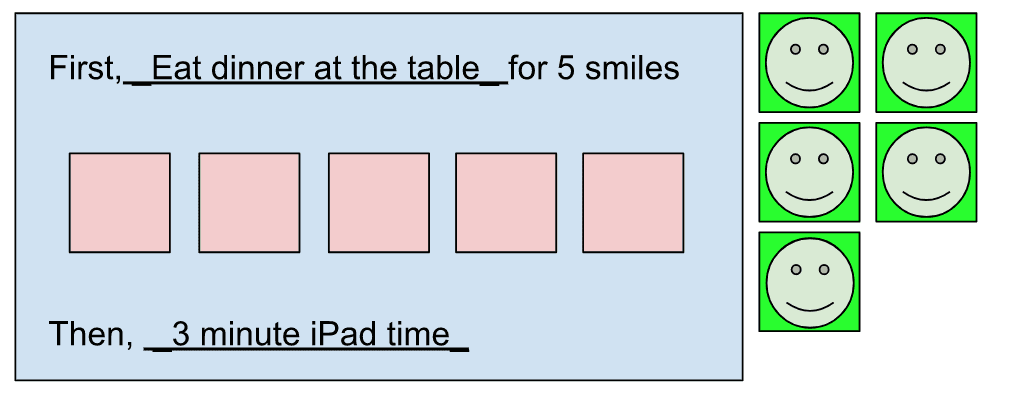A token economy system for behavior is a reward system that provides tokens that represent working towards a goal. They reinforce the desired behavior, whatever that might be for your specific situation.
For example, you might want your child to sit at the dinner table and eat with your family. Right now, she refuses to sit at the table during dinner and prefers to lay in her favorite spot with her iPad. You have the iPad turn off using the Guided Access timer and encourage her to come to the table. You present her with the following token system, which might be a laminated sheet with laminated green pieces that attach with velcro to the red boxes.

You say, “First, sit and eat with us to get five smiles, then I’ll unlock your iPad for 3 minutes for you to play on.” You stick the first green smile on the first red box and say, “for sitting down at the table.” She might complain but she still sits at the table, so you give her another smile. You give her smiles approximately every 30 seconds as long as she stays at the table (and maybe even takes a bite). Once you get to five, show her that she got five and give her the iPad time; allowing her to go to her favorite spot during this time.
Every time she achieves it, raise the bar a little higher. Maybe give her a smile approximately every 35 seconds. If the 3-minute reward doesn’t work, provide a longer time reward and scale it back over time. The tokens are like a loading bar to whatever your child desires more than the current activity.
Who is a good candidate for a token economy system for behavior?
This system works well for many children with developmental disabilities like Autism Spectrum Disorder, Down syndrome, or other global delays. This system also works well for children who have behavior challenges.
How can I set up a system that can work for my child?
First, think about the most motivating things in the world for them. Do they love playing with a beach ball? Are they big fans of Cocomelon? Do they love to swing in the backyard? How will you be able to inform them that the reward time is over? Timers and physical transitions can help.
Next, think about the specific behavior you want to see. Do you want them to do their homework? Do you want them to stop pulling their sibling’s hair and maintain a calm body? Try to be as specific as possible so they know exactly what they need to do to gain the reward.
Who can help me with my child’s behavior?
A licensed clinical psychologist can help diagnose and explore the cause of a child’s behavior in a full report. Clinicians at the Goldman Center focus on supporting children with developmental disabilities, behavioral challenges, and learning disabilities.
To set up a token economy system specific to your child’s needs, you and your child may work with a board-certified behavior analyst (BCBA). If your child is in the 2-5 age range, consider contacting Chicago ABA Therapy for support in setting up this tool. For older children, consider Clinical Psychologists or Occupational Therapists for behavioral evaluations and recommendations.
